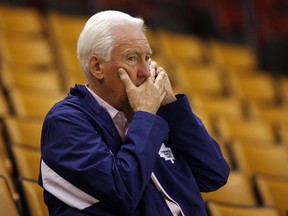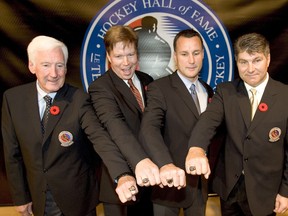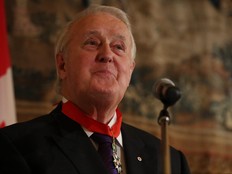SIMMONS: Trader Cliff Fletcher turns 90: Maple Leafs legend still going strong
One of the NHL's all-time best wheelers and dealers, Fletcher marks a big milestone birthday this weekend.

Article content
Everywhere Doug Gilmour and Mats Sundin go, they are associated as members of the Toronto Maple Leafs. Associated for life.
Both of them were brought to Toronto by general manager Cliff Fletcher in one-sided deals accomplished by the most astounding big-name and big-game trader in hockey history.
Everywhere Lanny McDonald goes, everywhere his moustache is shown across Canada, he is associated with the Calgary Flames, the face of that franchise even though he played just 492 of his 1,111 National Hockey League games there.
He was brought to Calgary in 1981, the second season after the club moved from Atlanta, in the deal that enabled Fletcher to begin the reshaping of the transferred franchise.
All of this — and so much more — will be talked about, laughed about and toasted over as stories will be told on Fletcher’s 90th birthday on Saturday with 18 family members and friends gathering for the weekend and longer in Laguna Beach, Calif.
“Has anyone else worked 70 years in the NHL?” asked his son, Chuck Fletcher, who still works as a senior executive with the New Jersey Devils. “My dad started with the Montreal Canadiens in 1955. He’s been drawing an NHL paycheque ever since.”
Fletcher is on the current payroll of the Maple Leafs in a role of senior adviser, although he admits it’s not much of a role anymore.
He has trouble walking and difficulty hearing these days, but no trouble watching hockey, talking hockey, or certainly retelling the stories of his own remarkable Hall of Fame career.
“His memory is incredible,” said Chuck, who has worked in the front office of six NHL teams. “He can tell you everything. You do all the things that he’s done and to have the ability to recall it all in such vivid detail, it’s very impressive.”

What’s impressive is the list of accomplishments for his dad along the way. Trading is almost a lost art in today’s salary-capped hockey world. But, when it wasn’t, Fletcher was a veritable master of the big deal.
Just months after he had left Calgary for the Leafs, Fletcher stole Gilmour from the Flames. He all but stole Sundin for 13 Toronto seasons from Quebec in an emotional exchange for Wendel Clark and others in one of the most difficult trades he ever made. He stole McDonald from what was then the Colorado Rockies to begin the Flames footprint in Alberta.
He did a lot of stealing along the way.
But that wasn’t all. In Calgary, he traded for Hall of Famer Joey Mullen and traded away the Hall of Famer Brett Hull. He traded for Grant Fuhr in Toronto and then dealt the Hall of Fame goalie to Buffalo for Hall of Fame winger Dave Andreychuk. He brought Tie Domi to the Leafs, traded for and traded away Larry Murphy, traded Mike Gartner for Glenn Anderson.
He drafted Hall of Fame players Al MacInnis, Joe Nieuwednyk, Mike Vernon, Hull and Sergei Makarov with the Flames, while also bringing borderline Hall players such as Gary Roberts, Gary Suter, Theo Fleury, Kent Nilsson and Paul Reinhart to the NHL.
The resume has just one Stanley Cup — the 1989 victory by the Flames — and that seems wrong. It should have been more. At least one more from Calgary. And who knows what might have happened had the refereeing turned out differently in the 1993 Leafs playoff series against Los Angeles.
But when Fletcher looks back now at so many exceptional deals, he does so with a certain pride and reverence.
“For 2 1/2 years, Gilmour was the best player in the NHL … I thought we brought instant credibility back to the franchise at that time,” Fletcher said in a lengthy telephone interview.
“Lanny gave our franchise credibility (in Calgary) when we had this all-time juggernaut just 180 miles down the road in Edmonton and had to establish something to compete.
“Quebec had Joe Sakic and Peter Forsberg as its top two centres. Mats was the third centre on that team and they had just lost a playoff series to Montreal getting outmuscled pretty badly. They needed toughness. They needed someone like Wendel. I always thought the best way to make a trade sometimes was to figure out what your opponent needed to make their roster better and, if it worked for both of you, terrific.
“That happened with the Brett Hull trade. I said when we dealt him, that he would score 150 goals the next three seasons. Turned out I was wrong, I think he scored 160. But we wound up winning the Stanley Cup (with Rob Ramage). You never want to trade a player like that away, but that’s my only championship and I’ll take that deal any day of the week to get a Stanley Cup.
“You know, I was able to trade Brett because we had Joey Mullen, a 50-goal scorer at right wing. We had Hakan Loob, a 50-goal scorer and we had Lanny, all on right wing.”
Of all the famous deals made, the one that rarely gets mentioned is a deal close to Fletcher’s heart.
“I won’t call it my biggest trade, but it might be the most significant,” Fletcher said.
In August of 1987, Fletcher acquired defenceman Brad McCrimmon from Philadelphia in exchange for first- and third-round draft picks. That was before his famous ‘Draft Shmaft’ line in Toronto became famous. But the importance of the deal remains with Trader Cliff.
“We gave up a lot for Brad McCrimmon, but he did so much for us,” Fletcher said. “He was our leader in the dressing room. He was our leader on the ice and a very physical presence. He ran the room. In a way, he ran our team. You can’t underestimate what he meant to us.
“The Flames team that won the Cup in ’89 had six Hall of Fame players on it, but we were almost eliminated in the first round to Vancouver, who finished 40 points behind us. If Vernon doesn’t make two career-like stops in overtime, we’re gone — there is no Stanley Cup. After that, we go on to beat L.A. in four, Chicago in five before beating Montreal in six. That’s how close it can be between winning and losing.
“In 1986, things were different then. They didn’t schedule days off between playoff series. We played St. Louis in the conference final and went seven games with them, even though we shouldn’t have. The final started right after Game 7. We ran out of gas by about Game 3. The way they schedule things today, with more time off, we might have won that year.”
That was the year they knocked out the dynastic Edmonton Oilers, interrupting what could have been a run of five straight Stanley Cups. Those were the Oilers of Wayne Gretzky, Mark Messier, Fuhr and Paul Coffey. The Oilers they played sometimes 18 times a season.
“You have to understand, we move from Atlanta, we’re the nobodies trying to establish ourselves and there’s this all-time juggernaut building just down the highway. It was an incredible challenge to build a team that could compete with them, let alone win.
“I’m proud of what we accomplished in Calgary.”
The hockey in Alberta in the ’80s may have been the greatest NHL hockey ever played.
When Fletcher decided to leave the Flames, where he had begun as expansion general manager in Atlanta, after the 1991 season, he thought he would take a year off and enjoy Florida life.
Instead, he immediately was sought after by the two wealthiest teams in the NHL. Both the New York Rangers and the Leafs offered him front-office control of their hockey operations. He listened to both pitches and he chose Toronto.
At the beginning of his second season with the Leafs, his first full-time with Gilmour, his first with Pat Burns coaching, the Blue Jays scored their first of two consecutive World Series victories.
“Toronto was electric back then, sporting-wise” said Fletcher, whose two children grew into adults in Toronto. (His daughter Kristy is the COO of the Juno Awards). “What the Blue Jays did — we respected their operation so much — was incredible. Their excitement became part of our excitement.”
As Fletcher gets ready to celebrate his 90th birthday, he knows that Pat Gillick, the architect of those Blue Jays teams, has a birthday coming up in just a few days: “He’s just a few years behind me. I think he’s turning 88.”

When Fletcher came to Toronto, he got to know one of the board members of the Leafs — including a guy named Ted Rogers.
All these years later, Ted has long since passed and the Leafs are corporately owned by Ted’s son, Edward. The board Ted was part of was tossed aside when Steve Stavro took ownership control of the Leafs.
And Fletcher, who had two different stints as GM, with Stavro and with Maple Leaf Sports and Entertainment, has remained with the team through the past five general managers. And, while he doesn’t travel much anymore, he doesn’t miss a game on television.
“I know how seriously he takes this,” Chuck said. “I’ve sat with him for a lot of those Leafs playoff games. And he’s a diehard, He’s all-in. And that Florida series last year, with all the highs and lows of that series, that was a tough one to get through.”
Fletcher jokes that he plans on living long enough to see the Leafs win a Stanley Cup. He says he has no intention of “leaving this side of the lawn” before that happens.
But about this season, who knows?
“In my own mind, I second-guess everything going on around the league like any other fan or media member,” he said. “It’ll be a challenging time for them. Mitch Marner is one of the best players in the NHL. He wasn’t coming back and it’s up to us now — Brad Treliving and his crew — to find a way to get around it.
“I have so much respect for the current organization that I’m sure they will recover and go back to being one of the best teams in the league.”
Either way, Cliff Fletcher will have his say. Either from his couch in Arizona or from his Leafs-issued cell phone.
X.com/simmonssteve













Postmedia is committed to maintaining a lively but civil forum for discussion. Please keep comments relevant and respectful. Comments may take up to an hour to appear on the site. You will receive an email if there is a reply to your comment, an update to a thread you follow or if a user you follow comments. Visit our Community Guidelines for more information.